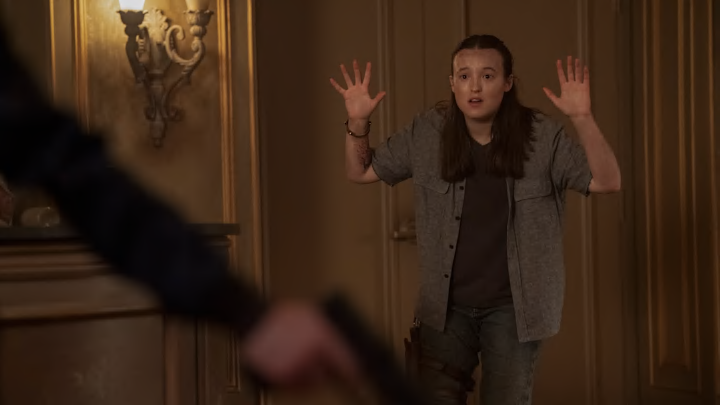As a second season of a television series rather than a video game adaptation, The Last of Us does not quite meet the mark of the storylines it wants to introduce. Picking up five years following the conclusion of season one, Ellie and Joel's relationship is not the happy and growing father-daughter dynamic that it was left on, but instead an angst-filled estrangement, leaving the question hanging in the air of what really caused their fallout. Except, Ellie and Joel's relationship simultaneously is and is not the center of season two. Joel's death in the second episode prevents his and Ellie's relationship from growing further. However, Joel's demise leaves behind season two's main arc: Ellie's striving for revenge against Abby.
Where season one is a post-apocalyptic thriller with a very specific quest plot of Joel and Ellie reaching the Fireflies, season two struggles with characters, side quests, and main motivation. Season two only consists of seven episodes, which is not nearly enough time to portray the emotions that Ellie must be going through following Joel's death, especially since the series has to portray Ellie's emotional arc in five. Within the five episodes that focus on the revenge plot, The Last of Us never quite dedicates itself to showing the build-up of Ellie's growth from devastated grief to tunnel-vision anger and need for vengeance. For the most part, Ellie appears to be fairly in control of her emotions, and while she does have a goal in mind to kill Abby, that does not stop her from having more kind and emotional moments with Dina. That element offers the character a softer aspect to her humanity rather than a twisted edge of vengeance, and Bella Ramsey performs these moments of vulnerability beautifully. However, The Last of Us never gives Ellie the opportunity to truly spiral down the rabbit hole. By the time the season finale reaches Ellie's need to actually go through with the revenge plan, season two has been all over the place with emotions and motivation that comes across that Ellie is going after Abby now because the story calls for it, rather than a real sense of build-up to the main event that the season has supposedly been working toward.
Season two's pacing issues were not helped by subplots that introduce new characters and groups, which are never developed enough to care about them, and only take time away from further developing the previously established main characters. The Last of Us never quite creates the convincing story that Ellie is all in for revenge, as most of her and Dina's time after leaving the compound is spent bonding as a couple and escaping the infected rather than crafting a storyline or characterization that shows Ellie's spiral and desire for vengeance. Ellie and Dina's dynamic lies at the center of the season, even though Ellie's relationship with Joel is the main motivation behind Ellie's actions. It does not help that the groundwork that season two lays in preparation for season three is minimal at best, as The Last of Us prepares to switch to Abby's perspective. Abby barely participated in season two, and while video game fans who anticipate what is coming may be strapped in for the ride, Abby's role may not have been enough to convince television fans to return for season three with Abby at the helm. As a television character, season two could have incorporated her more into the story to draw interest in her character. Instead, with the way season two ends, while Ellie's fate is not confirmed in the season finale, it leaves the suggestion that season three could be a completely different show than the two already existing seasons.
For a season that presents itself as leading up to a massive confrontation between Ellie and Abby, it never actually gets there. They do meet again in the season finale, but the way the season goes about the build-up makes their reunion less than exciting. It certainly does not help that The Last of Us did not capitalize on Ellie's desire for revenge or show anything from Abby's perspective that would have led to more excitement of the two interacting again. This meeting is left entirely from Ellie's perspective, where the writing for the character in terms of anger is too underwhelming to truly be looking forward to what this confrontation could mean for either character. When season three comes, season two has not done enough to make Abby an exciting protagonist to the average television viewer who had no previous connection to the character.
